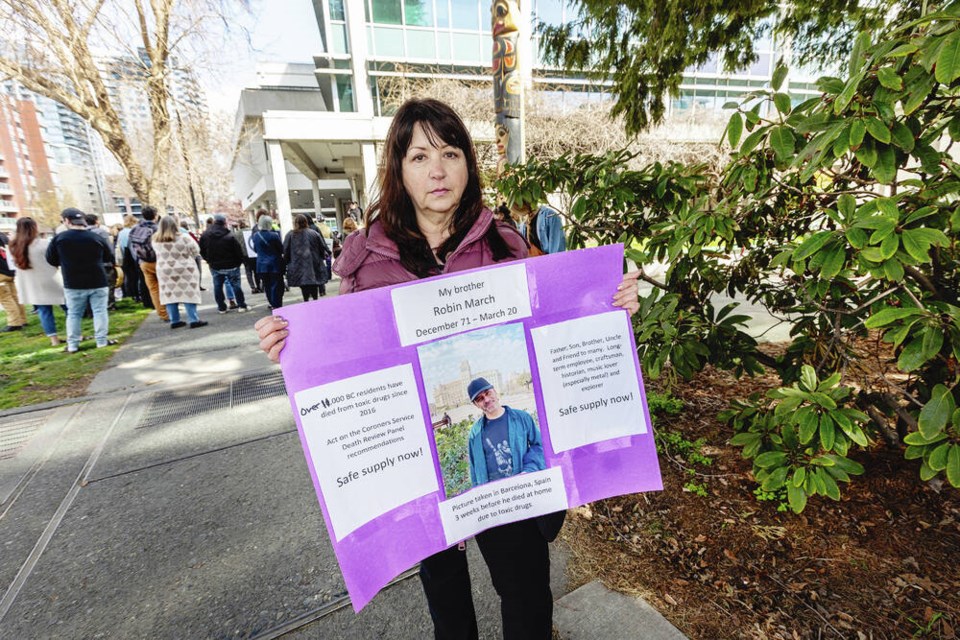Pamela Vivian can barely look at her vacation photos from the trip she took with her younger brother to Spain in early 2020.
Vivian and her brother, Robin March, visited Antoni Gaudi’s famous buildings in Barcelona, marched in Madrid for their great-uncle who died in the Spanish civil war, and March helped her with a documentary she was working on. It was his first trip outside of North America and he was dreaming of more.
“He really wanted to see things and experience more and sadly he didn’t have that opportunity,” Vivian said.
A couple of weeks after they returned home, March was found dead in his bedroom in the house he shared with their mother. He was 48 years old, a father of two children, a metalhead who went to as many metal shows as he could and a hard worker who spent a decade at the same vinyl decking company.
March was a casual drug user, although Vivian didn’t know it. He died after using toxic drugs.
For a long time, Vivian couldn’t look at the photos she took of her brother on their trip. On Friday, she carried a poster featuring March’s smiling face in Barcelona at a rally outside the Ministry of Health to mark seven years since the province declared a public-health emergency because of the high number of toxic-drug deaths.
Next to March’s photo is a number: “Over 11,000 –°¿∂ ”∆µ residents have died from toxic drugs since 2016,” it says. The original number, 10,000, has been scratched out, and a new one handwritten, because the initial statistic, written last August, has climbed so much higher in just a few months.
More than 11,390 people have died due to toxic drugs since 2016, the year –°¿∂ ”∆µ declared its public health emergency. In January, nearly seven people died each day in the province on average, for a total of 211. Thirty-nine of those deaths were in the Island Health region.
March’s body was found on March 16, 2020, the day before –°¿∂ ”∆µ declared a public health emergency for the COVID-19 pandemic. The stark contrast between the province’s response to each emergency weighs on Vivian. Pandemic restrictions to curb COVID-19 deaths brought in at the time of her brother’s passing meant Vivian couldn’t honour her brother’s life with the big party she knows he would have wanted. While COVID deaths have now dropped off, she watches as toxic drug deaths continue in huge numbers.
“They don’t seem to recognize the urgency,” she said.
–°¿∂ ”∆µ has taken steps to address the crisis, introducing a safer supply policy in 2021 and launching a three-year pilot project this year decriminalizing small amounts of certain drugs, but the efforts have been criticized as half-measures. Access to safer supply remains limited, and advocates have said the threshold for allowed personal possession, up to 2.5 grams of cocaine, methamphetamine, MDMA and opioids, is far too low.
Shane Calder, a drug policy advocate at the Canadian Drug Policy Coalition, said the government needs to move away from a purely medical model of safer supply that requires a prescription to access pharmaceutical grade drugs and focus on “the preservation of life.”
Street-level harm reduction services aren’t helping the majority of people who use, who are housed, he said. A safer supply of drugs needs to be expanded for anyone to access without barriers, prescriptions or monitoring, regulated in the same way marijuana is regulated, he said.
“I ought to be able to walk into that store over there and buy cocaine if I want to, given the fact that all the research shows that a lot of people use it. People use it responsibly. It has no impact on their family, jobs, school, lives, at all,” Calder said.
Jennifer Howard, a drug policy advocate with Moms Stop the Harm, lost her son Robby at 24 years old just weeks after –°¿∂ ”∆µ declared its public health emergency in 2016.
“There was no public awareness. It was really at the beginning,” she said. “That’s the tragedy of today, is to be standing here seven years later, and to see such a dismal lack of response that deaths are still escalating every day in this province.”
She said she can’t understand how the province can see such grim statistics come out each month and not be more alarmed.
“I just pray that we’re not here next year. It’s heartbreaking,” she said.




